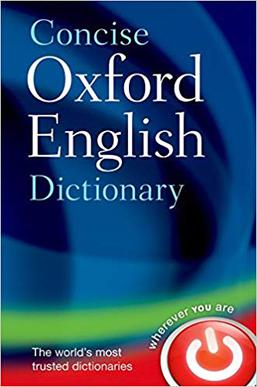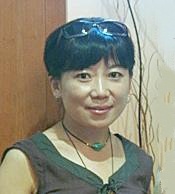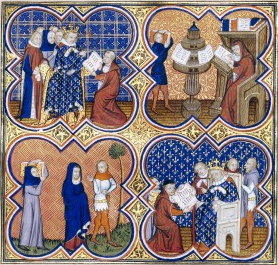Related Research Articles

The Tao Te Ching is a Chinese classic text written around 400 BC and traditionally credited to the sage Laozi, though the text's authorship, date of composition and date of compilation are debated. The oldest excavated portion dates back to the late 4th century BC, but modern scholarship dates other parts of the text as having been written—or at least compiled—later than the earliest portions of the Zhuangzi.

Umberto Eco was an Italian medievalist, philosopher, semiotician, novelist, cultural critic, and political and social commentator. In English, he is best known for his popular 1980 novel The Name of the Rose, a historical mystery combining semiotics in fiction with biblical analysis, medieval studies and literary theory, as well as Foucault's Pendulum, his 1988 novel which touches on similar themes.

Engrish is a slang term for the inaccurate, nonsensical or ungrammatical use of the English language by native speakers of Japanese, as well as Chinese and other Asian languages. The word itself relates to Japanese speakers' tendency to struggle to pronounce the English and distinctly arising from the fact Japanese has only one liquid phoneme, but its definition encompasses many more errors. Terms such as Japanglish, Japlish, Jinglish, or Janglish are more specific to Japanese Engrish. The related Japanese term wasei-eigo refers to pseudo-anglicisms that have entered everyday Japanese.
In linguistics, a calque or loan translation is a word or phrase borrowed from another language by literal word-for-word or root-for-root translation. When used as a verb, "to calque" means to borrow a word or phrase from another language while translating its components, to create a new lexeme in the target language. For instance, the English word "skyscraper" was calqued in dozens of other languages. Another notable example is the Latin weekday names, which came to be associated by ancient Germanic speakers with their own gods following a practice known as interpretatio germanica: the Latin "Day of Mercury", Mercurii dies, was borrowed into Late Proto-Germanic as the "Day of Wōđanaz" (*Wodanesdag), which became Wōdnesdæg in Old English, then "Wednesday" in Modern English.

Zhuang Zhou, commonly known as Zhuangzi, was an influential Chinese philosopher who lived around the 4th century BCE during the Warring States period, a period of great development in Chinese philosophy, the Hundred Schools of Thought. He is credited with writing—in part or in whole—a work known by his name, the Zhuangzi, which is one of the foundational texts of Taoism.

Chinglish is slang for spoken or written English language that is either influenced by a Chinese language, or is poorly translated. In Hong Kong, Macau, Guangdong and Guangxi, the term "Chinglish" refers mainly to Cantonese-influenced English. This term is commonly applied to ungrammatical or nonsensical English in Chinese contexts, and may have pejorative or deprecating connotations. Other terms used to describe the phenomenon include "Chinese English", "China English", "Engrish" and "Sinicized English". The degree to which a Chinese variety of English exists or can be considered legitimate is still up for debate.

The Concise Oxford English Dictionary is one of the best-known of the 'smaller' Oxford dictionaries. The latest edition contains over 240,000 entries and 1,728 pages. Its 12th edition, published in 2011, is used by both the United Nations (UN) and NATO as the current authority for spellings in documents in English for international use. It is available as an e-book for a variety of handheld device platforms. In addition to providing information for general use, it documents local variations such as United States and United Kingdom usage.
Chinese whispers or telephone is an internationally popular children's game. It is also called transmission chain experiments in the context of cultural evolution research, and is primarily used to identify the type of information that is more easily passed on from one person to another.

Burton Dewitt Watson was an American sinologist, translator, and writer known for his English translations of Chinese and Japanese literature. Watson's translations received many awards, including the Gold Medal Award of the Translation Center at Columbia University in 1979, the PEN Translation Prize in 1982 for his translation with Hiroaki Sato of From the Country of Eight Islands: An Anthology of Japanese Poetry, and again in 1995 for Selected Poems of Su Tung-p'o. In 2015, at age 88, Watson was awarded the PEN/Ralph Manheim Medal for Translation for his long and prolific translation career.

Zizhi Tongjian is a pioneering reference work in Chinese historiography, published in 1084 AD during the Northern Song dynasty in the form of a chronicle recording Chinese history from 403 BC to 959 AD, covering 16 dynasties and spanning almost 1400 years. The main text is arranged into 294 scrolls totaling about 3 million Chinese characters.

Gastronomy is the study of the relationship between food and culture, the art of preparing and serving rich or delicate and appetizing food, the cooking styles of particular regions, and the science of good eating. One who is well versed in gastronomy is called a gastronome, while a gastronomist is one who unites theory and practice in the study of gastronomy. Practical gastronomy is associated with the practice and study of the preparation, production, and service of the various foods and beverages, from countries around the world. Theoretical gastronomy supports practical gastronomy. It is related with a system and process approach, focused on recipes, techniques and cookery books. Food gastronomy is connected with food and beverages and their genesis. Technical gastronomy underpins practical gastronomy, introducing a rigorous approach to evaluation of gastronomic topics.

The Secret History of the Mongols is the oldest surviving literary work in the Mongolian language. It was written for the Mongol royal family some time after the 1227 death of Genghis Khan. The author is anonymous and probably originally wrote in the Mongolian script, but the surviving texts all derive from transcriptions or translations into Chinese characters that date from the end of the 14th century and were compiled by the Ming dynasty under the title The Secret History of the Yuan Dynasty. Also known as Tobchiyan in the History of Yuan.
Tong Zhonggui, known by the pen name of Su Tong is a Chinese writer. He was born in Suzhou and lives in Nanjing.

Google Translate is a multilingual neural machine translation service developed by Google to translate text, documents and websites from one language into another. It offers a website interface, a mobile app for Android and iOS, and an API that helps developers build browser extensions and software applications. As of June 2023, Google Translate supports 133 languages at various levels, and as of April 2016, claimed over 500 million total users, with more than 100 billion words translated daily, after the company stated in May 2013 that it served over 200 million people daily.

Tsering Woeser is a Tibetan writer, activist, blogger, poet and essayist.

Translation is the communication of the meaning of a source-language text by means of an equivalent target-language text. The English language draws a terminological distinction between translating and interpreting ; under this distinction, translation can begin only after the appearance of writing within a language community.
Hualing Nieh Engle, née Nieh Hua-ling, is a Chinese novelist, fiction writer, and poet. She is a professor emerita at the University of Iowa.

Tipiṭaka or Tripiṭaka, meaning "Triple Basket", is the traditional term for ancient collections of Buddhist sacred scriptures.
Xu Yuanchong was a Chinese translator, best known for translating Chinese ancient poems into English and French. He was a professor at Peking University since 1983.
References
- ↑ ""贪钱"的商人作家王刚" (in Chinese). 2009-05-16.